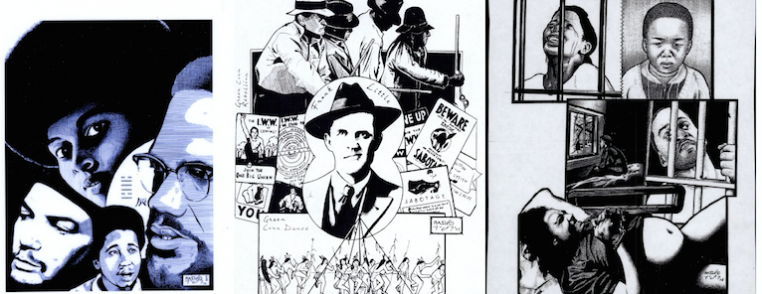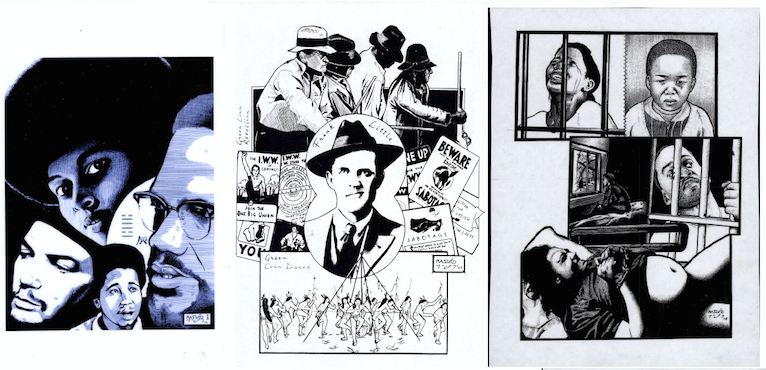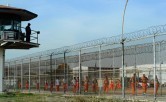
Free Virginia Movement Declaration
The Free Virginia Movement (FVM) is an Inside-Out, multiracial statewide movement founded and organized by people incarcerated in Virginia prisons affiliated with the Industrial Workers of the World (IWW) Union and sentenced under the so-called “no parole” or “85%” law.
The function and purpose of the FVM is to organize all “no parole” prisoners into one bloc or cohesive unit so that we can effectively oppose & challenge excessive sentences, long-term incarceration & mass incarceration as a result of the abolition of parole & truth-in-sentencing laws enacted by the VA General Assembly back in 1994; and unjust, inhuman & oppressive prison conditions which endangers/jeopardizes our spiritual, mental & emotional health & well-being, and which runs counter to (hinders) our growth and rehabilitative efforts in the VA Dept. of (In)Corrections.
Our Organizing Strategy
The FVM seeks to bring the entire VA prisoner-class sentenced under the “no parole” or “85%” law & outside Human Rights & Prison Advocacy Groups together across Racial, Gender, Ideological, Religious & Geographical lines—thereby creating a cross-denominational United Front unlike anything ever seen in the VA prison system.
At every stage of the struggle we have petitioned the courts, filed grievances & patiently waited for the VA State Government to take corrective action in the most humble method. But just like the institution of Chattel Slavery, mass incarceration is in essence an economic system which uses human beings as its nuts & bolts. Therefore, our new approach must be Economically based. As such, in the event our concerns continue to fall on deaf ears while the VA State Government, the VA Dept. of InCorrections & private corporations like JPay, Keefe Commissary, Global Tel Link, etc. continues to benefit from our exploitation & prolonged confinement, we agree that it will be necessary to engage in a statewide, proactive, peaceful & nonviolent collective work strike/stoppage, hunger strike, boycott, etc. to compel the VA State Government & the VA Dept. of InCorrections to be more receptive to our concerns & demands listed below. The accumulation of wealth & the oppression & social control of New Afrikans, poor people & other people of color is the motive behind mass incarceration here in VA. Therefore, an economic response (work strike/stoppage) and other forms of strikes & demonstrations will be our most effective strategy.
Our Goals (What We Want)
1. The Reinstatement of parole for all incarcerated people currently serving a sentence under the so-called no parole (85%) law by repealing VA Code §§ 53.1-165.1 & 53.1-202.3, & re-institute parole eligibility under VA Code § 53.1-201. The above restoration of Parole & Good Conduct Allowance must be retroactively applied to ALL incarcerated people currently serving sentences under the no parole (85%) law.
2. The Amendment & Reenactment of VA Code § 19.2-303 so that ALL people currently incarcerated in the VA Dept. of InCorrections can petition the Court that heard their case for a suspension/reduction/modification of the unserved portion of the sentence after 1) serving a base minimum of twenty (20) consecutive years in prison and, 2) after the completion of an Education/Rehabilitation/Reentry Preparedness Program. The Amendment & Reenactment of VA Code § 19.2-303 must be retroactively applied to ALL people currently incarcerated in the VA Dept. of InCorrections.
3. The Amendment & Reenactment of VA Code § 19.2-298.01 (B) & (F) so that the sentencing court must provide an adequate written explanation when it sentences a defendant outside the sentencing guidelines to allow for meaningful appellate review of said sentence. This will promote the perception of fair sentencing and to provide an appellate remedy when courts impose sentences that are ten (10) years or more outside the sentencing guidelines. The Amendment & Reenactment of A Code § 19.2-298.01 (B) & (F) must be retroactively applied to all people currently serving time under the no parole (85%) law.
4. The Amendment & Reenactment of VA Code § 53.1-40.01 so that the qualifying age for consideration of early geriatric release is 1) the age of 55 or older & who has served at least five years of the sentence imposed or 2) the age of 50 or older & who has served at least ten years of the sentence imposed. The Amendment & Reenactment of VA Code § 53.01-40.01 must be retroactively applied to all people currently incarcerated in the VA Dept. of InCorrections.
5. The Amendment & Reenactment of VA Code § 53.1-43.1 which allows the VA Dept. of Incorrections to profit off peoples incarceration by investing the interests gained from inmates’ funds in bonds & federally-insured investments. ALL income, profits, etc. gained as a result of these investments MUST ONLY be used for the benefit of inmates (i.e. education, rehabilitation, recreation) and not the VA Dept. of (In)Corrections or the VA State Government.
6. The Amendment & Reenactment of VA Code § 53.1-43.1 so that in addition to any inmate who has been sentenced to be executed or is serving a life sentence, any inmate who is serving a de facto “numerical” life term of fifty (50) years or more under the no parole (85%) law, shall be exempt from the withholding & depositing ten (10) percent of his/her incoming funds into a savings/trust account.
7. The abolition of any VA DOC policy, practice or procedure which endangers our spiritual, physical, mental & emotional health & well-being & which hinders & runs counter to inmates’ rehabilitative efforts, including but not limited to: (1) VA DOC’s Operating Procedure (OP) 601.6(IV)(c)(14) which prohibits inmates from completing more than one Career & Technical Education Program; (2) VA DOC’s Operating Procedure (OP) 601.6(IV)(c)(9) which discriminates against inmates with lengthy sentences who desire to enroll in a Career & Technical Education Program by placing said inmates on a separate “long list” where it may take years to enroll in any program; (3) VA DOC’s “cost saving” practice of assigning one inmate to multiple job (work) assignments which hinders other inmates from being assigned to a job (work) assignment “to learn job skills & develop good work habits & attitudes that [we]can apply to jobs after [we]are released,” quoting VA DOC’s OP 841.2(IV)(B)(4); (4) VA DOC’s racially & politically motivated practice of censoring/disapproving books, newspapers, magazines, etc. which are geared towards an African-American, Leftist, Radical & Progressive audience; (5) VA DOC’s “cost saving” practice denying Hepatitis-C-positive inmates FULL access to FDA-approved drugs like Sovaldi, Harvoni, Veikra-Tak, etc., which are known to cure people of Hepatitis C in as little as eight (8) weeks; (6) VA DOC’s “cost saving” practice of regularly feeding/serving inmates cheap soy, processed & other synthetic meats which are known by the FDA to contain carcinogens which causes various cancers if consumed on a regular (prolonged) basis; (7) VA DOC’s counter-rehabilitative and “cost-saving” practice of not providing practical up-to-date technology-based educational & career programs. VA DOC’s current educational & career programs are like relics of the past when compared to programs offered to American citizens out in society. VA prisons must move towards a technological educational & career programming system, and to not do so, is a disservice to VA inmates and the communities we’ll eventually return to. Therefore, educational & career (vocational) training must be up-to-date and resemble as closely as possible that of education & career (vocational) training offered to the average American citizen so as to prepare inmates for the conditions of normal occupational life.
Why the Free Virginia Movement
Violent Offender Incarceration & Truth-in-Sentencing Incentive Grants and the birth of the Abolition of Parole (85%) Law in Virginia
A federal law known as the Violent Crime Control and Law Enforcement Act of 1994 included a provision called the Violent Offender Incarceration and Truth-in-Sentencing incentive grants (VOITIS) which provided grants (funding) to state and local correctional systems to expand their capacity to incarcerate violent offenders and to impose longer and more determinate sentences. VOITIS, codified into federal law as Title 42 US Code Sections 13701, 13702, 13703, and 13704, was sponsored and introduced into the US Congress by former Representative Jack Brooks (TX-9) and signed into law the following year by then-President Bill Clinton. Before states could qualify for VOITIS grants, they were required to pass (adopt) Truth-in-Sentencing legislation which effectively abolished parole and mandated prisoners convicted of a class 1 felony to “serve not less than 85 percent of the sentence imposed…” (Title 42 US Code Section 13704).
Lacking the funds necessary to build more prisons to account for its expanding prison population, VOITIS provided Virginia with the inspiration to abolish parole for crimes committed on or after January 1, 1995. This legislation (House Bill No. 5001) was sponsored and introduced into the 1994 General Assembly Session by then-Republican Governor Allen during the 1994 Special Session. It must be noted that this legislation was heavily favored by the democrats who controlled both the House and the Senate in 1994.
House Bill No. 5001 was codified into law as Virginia Code Annotated (V.A. Code) Section 53.1-165.1. Consequently, the amount of good time prisoners could earn to reduce their period of incarceration for good behavior was reduced from a maximum of thirty days credit for each thirty days served per V.A. Code 531.1-201 (before parole was abolished) to a maximum of four and one-half days credits for each thirty days served under V.A. Code 53.1-202 (after parole was abolished). Prior to the abolition of parole and dramatic reduction in good time credits, Virginia’s prison population was approximately 18,000. As of 2013, the prison population had ballooned to almost 40,000.
Between 1996 and 1998, twenty-eight states that enacted truth-in-sentencing legislation collectively received over $680 million in VOITIS grants, according to the U.S. Dept. of Justice, Office of Justice Programs.
Fifteen out of twenty-seven states that received VOITIS grants in 1997 indicated that these grants were either a key or partial factor (motivation) in their enactment of truth-in-sentencing legislation which required prisoners to serve 85% of their sentences, including Virginia.
Between 1996 and 1998, Virginia alone received a total of $11,201,786 in VOITIS grants which partly funded the construction of two maximum- and two super-maximum-security prisons: Sussex-1 State Prison, Sussex-2 State Prison, Red Onion State Prison, and Wallens Ridge State Prison. All four of these “state-of-the-art” prisons began accepting warm bodies in 1997 and 1998, many of them contracted from out of state.
Because of tough-on-crime policies like Three Strikes, Mandatory Minimums, Truth-in-Sentencing, and the Abolition of Parole, the overall U.S. prison population has increased 700% between 1970 and 2010. As a result, the U.S. now holds the distinction of having the largest prison population (2.5 million) in the world.
In Virginia, African-Americans make up only 20% of the state population, but 60% of the prison population, and almost all prisoners come from poor or working-class communities.
Tough-on-crime policies like those mentioned above represent a gross social and racial injustice embedded within America’s system of legal jurisprudence, and working-class are left to foot the bill for mass incarceration.
Economic Impact
As of 2014, the VA Dept. of (In)Corrections’ annual operating budget has grown to over $1 billion, which is paid with tax dollars, as well as with capital generated from the cheap slave labor of prisoners who toil in Virginia Correctional Enterprises (VCE)-operated sweatshops, disciplinary fines, kickbacks from Keefe Commissary Group, Global Tel Link, JPay, etc., and interests gained from inmate Savings Accounts.
It costs almost $30,000 a year to keep long-term, rehabilitated prisoners locked up for crimes we committed in our youth.
A question that we want answered is: If Virginia stopped receiving VOITIS grants in 2007, and VOITIS grants were a key (or partial) factor in Virginia’s decision to abolish parole and implement Truth-in-Sentencing laws, why are prisoners convicted and sentenced under the so-called “no parole” (85%) law still required to serve 85% of our sentences?
The abolition of parole has not prevented, reduced, or deterred crime any more than it did prior to 1995 but has succeeded only in increasing the prison population and the VA Dept. of (In)Corrections’ annual budget to one of the highest in the country, while confining long-term, rehabilitated prisoners for decades with no realistic opportunity for release.
On June 24, 2015, Virginia Governor Terry McAuliffe sought to correct these problems when he signed Executive Order #44, creating the Parole Review Commission to “address five significant priorities related to Parole Reform:
1. Conduct a Review of Previous Goals and Subsequent Outcomes. The Commission shall review whether abolishing parole achieved the intended goals of preventing new felony offenses, reducing crime, and reducing recidivism. The Commission’s analysis shall include, at a minimum, a qualitative analysis of pre- and post-1995 trends in crime rates, incarceration rates, sentence lengths, and recidivism rates.
2. Examine the Cost of Parole Reform/Abolition. The Commission shall conduct an analysis of the fiscal impact abolishing parole has had on the Commonwealth, as well as an analysis of the societal costs on communities and families from longer incarceration.
3. Evaluate the Best Practices of Other States. The Commission shall research and evaluate what policies and practices have proven successful or unsuccessful in other states, and explore the application of the most successful approaches in the Commonwealth.
4. Recommend Other Mediation Strategies. The Commission shall examine what other approaches could be used to achieve similar results in terms of preventing new felony offenses, reducing crime, and reducing recidivism. Virginia must pursue cost-saving, evidence-based, and multifaceted approaches to reducing crime while also improving outcomes for offenders, families, and communities.
5. Provide Recommendations to Address Public Safety Challenges. The Commission shall provides its recommendations on how Virginia may best position itself to address the public safety challenges resulting from changes to parole. These final recommendations shall include any proposed legislative or executive branch necessary, as well as any potential private sector engagement…..”
Per this Executive Order, the Commission was required to provide an interim report to Governor McAuliffe no later than November 2, 2015, with a final report due by December 4, 2015.
Seeing that several public meetings were held by the Commission where the ideas, opinions, and concerns of families and friends of prisons and other concerned citizens in favor of parole reinstatement/reform repeatedly fell on the deaf ears of Commission members; Seeing that the Commission has recommended not to reinstate parole because state Republicans who appointed the Commission were openly hostile to the idea of parole reinstatement and have vowed that parole will never be reinstated so long as they (Republicans) constitute the majority in the Virginia General Assembly; Seeing that Republicans will constitute the majority in the Virginia General Assembly for the foreseeable future; And as a result, seeing that mass incarceration, overcrowded and understaffed prisons, draconian truth-in-sentencing sentences, no parole, long-term incarceration with no realistic chance of release, cutbacks to rehabilitative programs, and VA Dept. of (In)Corrections’ policies and procedures which aggravate the suffering inherent in our incarceration will persist, it is time we unite and organize peacefully and nonviolently inside of these prisons to bring about substantive change via boycotts, sit-downs, and/or work/hunger strikes. WE HAVE NOTHING TO LOSE BUT OUR CHAINS!
https://iwoc.noblogs.org/post/2016/02/16/free-virginia-movement-declaration/




